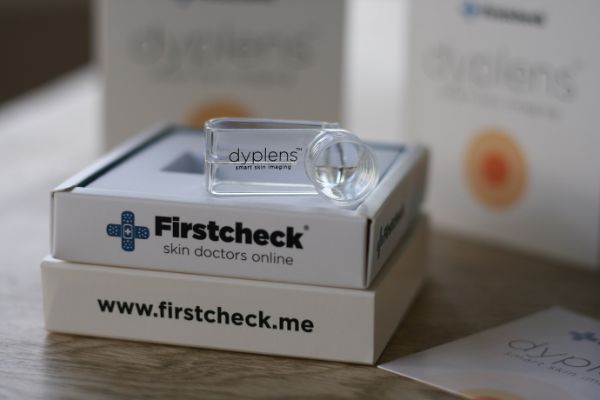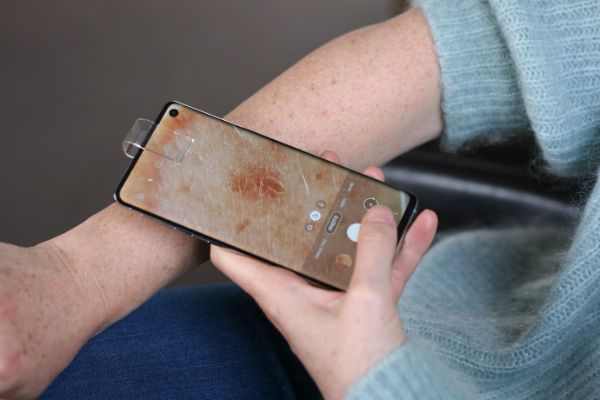Hospital Trial Validates Digital Skin Cancer Checking Device
Firstcheck's second generation, clip on lens for checking skin cancers using a smart phone has been found to be "ideal for consumer use" in a review at Waikato Hospital this month.

Led by renowned dermatologist, teledermatology expert and key opinion leader, Associate Professor Amanda Oakley (CNZM), the hospital review of Firstcheck’s dyplens® found it to be easy to use with good image quality for checking suspicious moles.
Firstcheck’s device enables smartphones to capture clinical-quality photographs of moles that can then be assessed online by skin cancer doctors. The device enables the capture of micro detail and subsurface detail of the skin that cannot be seen with the naked eye - or with simple magnification alone.

Providing a new, low-cost way to get moles checked, consumers can then upload the smartphone photos (‘selfies’) directly to skin cancer doctors via Firstcheck’s telehealth platform and receive a written report back often the same day.
High specification devices used by dermatologists cost hundreds or thousands of dollars and rely on in-built lighting systems. Firstcheck's device cleverly uses natural lighting providing a much lower-cost solution and selling for just $29.95 including courier delivery.
The results of Dr Oakley independent clinical assessment will support Firstcheck's mission of improving access to reliable skin cancer screening services with low-cost and convenient digital tools, says Firstcheck’s CEO Hayden Laird.
“Firstcheck is an affordable way of getting something on your skin checked by a doctor from the convenience of home,” says Laird.
“Everyone should be regularly self-checking their skin at least every 3 months for warning signs of skin cancer and getting any spots of concern checked promptly by a doctor. With the Firstcheck app, you can get something checked by a doctor via your smartphone.”
During COVID-19 lockdowns, Firstcheck’s digital solution proved very useful for doctors to help service patients who could not access clinics.
“Together with our clinicians, we’re trying to make it as easy as possible for everyone to get spots checked as and when they notice something of concern – so that the warning signs of skin cancer do not go left unchecked,” explains Laird.
“The technology we are using is proven and low-cost and has the potential to make a real difference to our country’s unenviable skin cancer statistics.”
“The low-cost device can be added to your home medical cabinet or first aid kit ready for when you need it.”
“Our advice is to check yourself, check your loved ones, and if in doubt, get it checked out - you might just save a life”.


 PHARMAC: Pharmac To Fund Medicines For Blood Cancers, Inflammatory Bowel Disease, Eczema And Arthritis
PHARMAC: Pharmac To Fund Medicines For Blood Cancers, Inflammatory Bowel Disease, Eczema And Arthritis  NZ Principals Federation: Principals Support NZEI's Call For Learning Support Boost
NZ Principals Federation: Principals Support NZEI's Call For Learning Support Boost NPDC: A Century On Stage - TSB Showplace To Celebrate 100 Years With Spectacular Show
NPDC: A Century On Stage - TSB Showplace To Celebrate 100 Years With Spectacular Show Dame Malvina Major Foundation: Kiwi Opera Star Emmanuel Fonoti-Fuimaono Joins The Royal Opera, London
Dame Malvina Major Foundation: Kiwi Opera Star Emmanuel Fonoti-Fuimaono Joins The Royal Opera, London Aotearoa Music Awards: 60 Years Of Tūī - Presenting The Finalists For The 2025 Aotearoa Music Awards
Aotearoa Music Awards: 60 Years Of Tūī - Presenting The Finalists For The 2025 Aotearoa Music Awards PATHA: Health Professional Bodies Oppose Restrictions On Puberty Blockers
PATHA: Health Professional Bodies Oppose Restrictions On Puberty Blockers